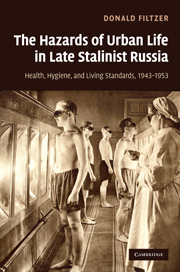Book contents
- Frontmatter
- Contents
- List of figures
- List of maps
- List of tables
- Preface and acknowledgements
- List of terms and abbreviations
- 1 Map of the regions covered in the book, from Moscow in the west to Kemerovo oblast' in Western Siberia
- 2 The Volga and Kama River networks
- 3 Moscow and Moscow oblast'
- 4 The Urals and its major rivers
- The Kuzbass and the River Tom'
- Introduction
- 1 The impossible task: keeping cities clean
- 2 Water
- 3 Personal hygiene and epidemic control
- 4 Diet and nutrition: the 1947 food crisis and its aftermath
- 5 Infant mortality
- Conclusion
- Bibliography
- Index
Introduction
Published online by Cambridge University Press: 06 July 2010
- Frontmatter
- Contents
- List of figures
- List of maps
- List of tables
- Preface and acknowledgements
- List of terms and abbreviations
- 1 Map of the regions covered in the book, from Moscow in the west to Kemerovo oblast' in Western Siberia
- 2 The Volga and Kama River networks
- 3 Moscow and Moscow oblast'
- 4 The Urals and its major rivers
- The Kuzbass and the River Tom'
- Introduction
- 1 The impossible task: keeping cities clean
- 2 Water
- 3 Personal hygiene and epidemic control
- 4 Diet and nutrition: the 1947 food crisis and its aftermath
- 5 Infant mortality
- Conclusion
- Bibliography
- Index
Summary
Standard of living, “quality of life,” and popular welfare
In 1947 the American Review of Soviet Medicine published an article by Peter Belikov, a Soviet public health physician, which gave a glowing account of the state of sanitation and disease control inside the USSR. Addressing the question of how the country was reducing the incidence of, and mortality from, intestinal infections, in particular among its young children, it attributed success in this area to two sets of factors. The first was the high quality of medical care that patients received. Doctors arrived quickly to attend the sick, made a rapid diagnosis, and referred patients almost immediately to hospital. At the same time living quarters were disinfected and contacts tracked down and isolated. The second weapon in the battle against gastrointestinal disease was the country's extensive system of urban sanitation and public health controls. These Belikov described as follows:
Sanitary measures to prevent spread of infection by water, milk and foodstuffs, are realized in the USSR on a very wide scale because no expense is spared and time taken to complete the construction and extension of water works, sewage systems, and garbage disposal stations. These works were uninterrupted during the war wherever possible. The water of all reservoir systems is subjected to regular bacteriologic control and is chlorinated daily. Wells which are still maintained in small cities are also chlorinated. In all industries closed tanks with water boiled and cooled have been set up. This has also been done in all ports and railroad stations where boiling water is always available for travellers in any desired quantity.[…]
- Type
- Chapter
- Information
- The Hazards of Urban Life in Late Stalinist RussiaHealth, Hygiene, and Living Standards, 1943–1953, pp. 1 - 21Publisher: Cambridge University PressPrint publication year: 2010



